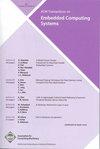概率反应时间分析
IF 2.8
3区 计算机科学
Q2 COMPUTER SCIENCE, HARDWARE & ARCHITECTURE
引用次数: 1
摘要
在许多嵌入式系统中,例如,在汽车、航空电子或机器人领域,关键功能是通过通信循环任务链实现的。为了确保这些系统的安全性和正确性,必须保证反应时间,即原因(例如,外部活动或传感器读数)与相应效果之间的延迟。目前的方法关注最大反应时间,考虑最坏情况下的系统行为。然而,在许多情况下,对反应时间的概率保证是足够的。也就是说,保证反应不以(至少)一定的概率超过一定的阈值就足够了。本文在考虑两种类型的随机性:响应时间随机性和失效概率的情况下,对反应时间提供了这样的概率保证。据我们所知,这是第一个定义和分析基于零星任务的因果链的概率反应时间的工作。本文章由计算机程序翻译,如有差异,请以英文原文为准。
Probabilistic Reaction Time Analysis
In many embedded systems, for instance, in the automotive, avionic, or robotics domain, critical functionalities are implemented via chains of communicating recurrent tasks. To ensure safety and correctness of such systems, guarantees on the reaction time, that is, the delay between a cause (e.g., an external activity or reading of a sensor) and the corresponding effect, must be provided. Current approaches focus on the maximum reaction time, considering the worst-case system behavior. However, in many scenarios, probabilistic guarantees on the reaction time are sufficient. That is, it is sufficient to provide a guarantee that the reaction does not exceed a certain threshold with (at least) a certain probability. This work provides such probabilistic guarantees on the reaction time, considering two types of randomness: response time randomness and failure probabilities. To the best of our knowledge, this is the first work that defines and analyzes probabilistic reaction time for cause-effect chains based on sporadic tasks.
求助全文
通过发布文献求助,成功后即可免费获取论文全文。
去求助
来源期刊

ACM Transactions on Embedded Computing Systems
工程技术-计算机:软件工程
CiteScore
3.70
自引率
0.00%
发文量
138
审稿时长
6 months
期刊介绍:
The design of embedded computing systems, both the software and hardware, increasingly relies on sophisticated algorithms, analytical models, and methodologies. ACM Transactions on Embedded Computing Systems (TECS) aims to present the leading work relating to the analysis, design, behavior, and experience with embedded computing systems.
 求助内容:
求助内容: 应助结果提醒方式:
应助结果提醒方式:


